Plugging the concept of `One Nation’, PNCR Leader David Granger said yesterday “Let us keep the pressure up to push the PPP out of office, elect a government of national unity and give the Guyanese people the good life that they deserve.”
This was his charge to those who attended the opening ceremony of the party’s 18th Biennial Congress at Congress Place, Sophia yesterday afternoon.
Granger, who will be challenged for the party’s leadership by Linden strongman Aubrey Norton, was escorted into the Congress Hall
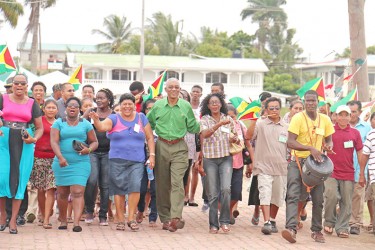
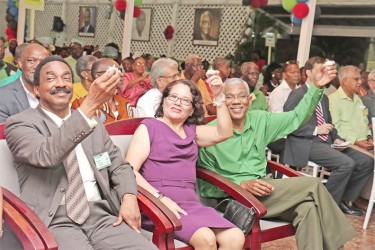
where he was greeted with abundant cheers and chants that he is the party’s “only leader.”
In recent days, the quality of Granger’s leadership has come under intense criticism in the media and he now faces various challenges including holding on to leadership of the party, a bitter internal row surrounding MP Vanessa Kissoon that has embittered the PNCR’s traditional Linden stronghold and a looming vote on a motion of no-confidence against the government which is being piloted by the Alliance For Change.
While he gave no hint about how the PNCR-led APNU coalition would vote on the no-confidence motion, when he spoke yesterday about the governance crisis in the country he noted that Minister of Finance Dr Ashni Singh’s stewardship of the nation’s finances has been a key source of contention.
“We shall soon settle that!” he declared.
Though he elaborated on a list of the perceived failures of the People’s Progressive Party/Civic (PPP/C) Granger centred his address on the need for a new government of national unity, as opposed to the perceived autocratic administration of the current government. He, however, made no specific demands for constitutional reform or shared governance.
A government of national unity, he says, was always the intention of PNC leaders beginning with Linden Forbes Burnham, the party’s founder. Burnham, Granger told delegates and members hailing from Guyana’s ten regions and abroad, started the initiative by commencing talks with the PPP in 1976 to have a government of national unity. He noted that the party invited civil society groups into its folds under Desmond Hoyte’s leadership, and it was noted that Robert Corbin, who succeeded Hoyte, brought several opposition parties together to forge the PNCR-One Guyana alliance.
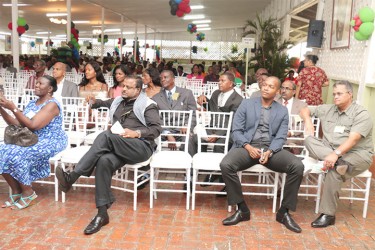
Granger noted that inclusionary democracy is essential if a government of national unity is to be realized. Instead of lending to shared governance though, as is provided for in Guyana’s constitution, Granger lamented what he says is the PPP/C’s insistence on autocratic governance.
He asserted: “The people want greater inclusion, not exclusion. The current ‘dispensation’ in the National Assembly requires consultation and cooperation between the legislative and executive branches of government instead of the current convention of confrontation favoured by the PPP. The PNCR is convinced that greater national unity will bring greater national benefits including:
elimination of one-party domination of the government;
enhancement of local, municipal and parliamentary democracy;
enlargement of multi-ethnic space and the elimination of ethnic insecurity;
expansion of economic enterprise and development; and
enrichment of cultural life, national consciousness and pride.”
He said that though the results of the 2011 elections indicated that the people are unsatisfied with the PPP/C government, the Donald Ramotar administration has sought to adopt a posture of confrontation instead of acknowledging its minority position and helping to facilitate relationships which include negotiation and consultation.
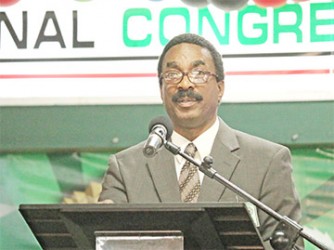
Great leap backwards
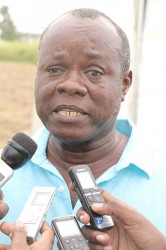
“President Donald Ramotar took a great leap backwards at the 30th Congress of the People’s Progressive Party on 2nd August 2013 at Port Mourant. His vituperative tirade was a threat to the prospect of inclusionary democracy and a menace to the project for national unity. He had the opportunity at the PPP’s first congress in five years to drop his party’s time-worn, winner-takes-all approach and adopt an inclusionary approach to governance. He lost it. He went instead on an unapologetic and uncompromising offensive against the Opposition in the National Assembly and the independent media.
“President Ramotar’s ‘feral blast’ against the National Assembly, suggests that he has not comprehended the concept of cooperation. He did not seize the opportunity to encourage party members to pursue a more collaborative approach with the parliamentary majority for the good of the nation.
“The President characterised the National Assembly as `a wound on the body politic of our nation…that is festering and reopening every time a sensible, moral and costed development project is stalled because the Opposition wants to hold back progress or the cheap publicity or promoting agendas inimical to our people.’”
The PNCR is bound to respond to this threat to parliamentary democracy, Granger said.
He also cited the president’s declaration that he would not assent to any opposition bill unless it has the government’s backing as further evidence of the PPP/C “backward” approach to governance in light of the new dispensation in the National Assembly. The president, he continued, has also tried to diminish the authority of the National Assembly by challenging its decisions in court. Even the Speaker of the House, Granger highlighted, felt compelled to write to the Executive branch of government warning of an impending constitutional crisis if it continued to use the courts to challenge the decisions of the legislature.
Video: Part 2
Granger says that the government’s inability to hold local government elections after twenty years, and the installation of ministry-appointed Interim Management Councils (IMCs) in local authority areas is further evidence of the PPP/C’s bid to monopolize governance. The PPP/C’s “chronic maladministration,” he suggested, has precipitated a flurry of crises.
He cited crises in human development, youth affairs, governance, education, the hinterland, public security and social protection. Granger says that the inability of the government to foster development has damaged the quality of education offered from the primary to tertiary level on the coast as well as in the hinterland regions.
He also pointed to high unemployment and underemployment rates and the high migration rate which these and other factors feed.
He charged that the PPP/C was sitting on a time bomb of youth unemployment.
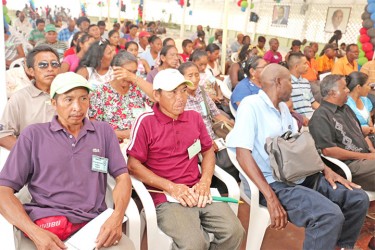
Central issue
“Nearly seven out of every ten citizens are classified as ‘Youths’ and children. The PNCR believes, also, that unemployment is the central issue affecting young people in Guyana. The PNCR warned the PPP/C that this country is sitting on a ‘time bomb’ of youth unemployment. The government’s delay in dealing with the jobs crisis and its disregard for measures to defuse it can detonate a social explosion which could have
dangerous consequences. The National Employment Report published by the International Labour Organisation estimated that, based on Guyana’s Household Income and Expenditure Survey (HIES), which was last undertaken over a decade ago, about 44 per cent of the population of working age are `not economically active.’”
He said that jobs are scarce and the economy is simply not providing employment opportunities.
Granger also charged that the hinterland is in crisis.
“Parts of the country west of the Essequibo River still endure ‘frontier’ conditions. Parts of the hinterland can be lawless and dangerous places. Banditry is rampant; contraband smuggling is commonplace; disease is prevalent; poverty is pervasive and educational standards are among the lowest in the country. The hinterland comprises over three-quarters of this country’s territory. Long unwatched land borders with Brazil, Venezuela and Suriname; vast unpatrolled open spaces; unmonitored airstrips and numberless rivers have become corridors for illegal narcotics and firearms to be carried to commit crimes on the coastland.
Video: Part 3
“Some mined-out parts have degenerated into a mosquito-infested wasteland. Its evergreen forests and pristine waterways are under threat of damage and contamination. Its people are poor. The hinterland’s mining, logging and tourism resources have been exploited for over a century and continue to enrich the national treasury, but their physical infrastructure is inadequate for such vast territory. Its small, scattered population is vulnerable to criminal violence, human trafficking and environmental hazard and must bear the burden of a high cost of living”, he lamented.
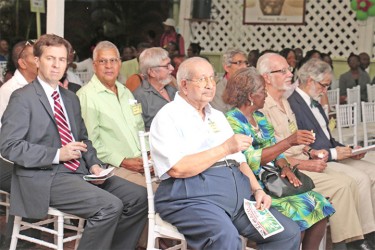
On public security he warned again that narco-trafficking was the engine that was pushing the country’s high rate of execution-murders, money-laundering and gun-running.
“The lucrative narco-trade has spawned criminal cartels. Drug lords have been able to deploy their fortunes to purchase political influence in order to protect their interests. Money-launderers also distort the domestic economy by pricing their goods and services below market rates which undermine legitimate businesses.
“….Guyana’s counter-narcotics enforcement agencies have been strangely incapable of identifying the criminal cartels which construct illegal airstrips and coordinate the air traffic enabling the large-scale importation of illegal narcotics into the country. It is estimated that ‘execution-type killings’ – many of which are suspected to be related to narcotics-trafficking – account for about one-third of all murders”, Granger lamented.
He also gave a hint of continuing party reforms.
“The PNCR understands that the building blocks of One Nation include not only new policies but also a continuous process of party reform. Our Party, therefore, is continually renewing itself within the Partnership as a movement to give a voice to people from every part of the country and every part of our great diaspora”, he stated.
The only solution, Granger told his supporters, is the “one nation solution” with A Partnership for National Unity at the helm.
“Our one nation project shows how our policy programme, once we return to government, will be relevant to people’s everyday experiences and expectations. Our resilient and resourceful people are communities are eager to play their part in rebuilding put country as on nation.” Towards this end he iterated the party’s call for Bartica, Mahdia, Mabaruma and Lethem to be upgraded to townships and for them to be equipped with mayors and town councils.
“The big question facing Congress today is…are you happy living in Guyana today… If the answer is no, come with me; let us fight the PPP not one another. Let us keep the pressure up to push the PPP out of office, elect a government of national unity and give the Guyanese people the good life that they deserve,” the PNCR leader ended to a standing ovation.








